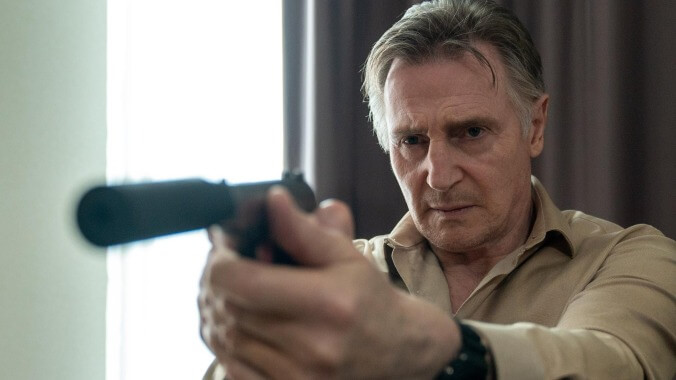Despite a gifted cast, Memory only evokes better films
If only the forgettable nature of this hitman film featuring Liam Neeson, Guy Pearce, and Monica Bellucci was deliberately ironic

“I can tell you he’s an American,” declares FBI Agent Vincent Serra (Guy Pearce), with absolutely unmerited confidence, upon hearing the voice of [checks notes]… Liam Neeson. No disrespect intended to Mr. Neeson, mind you, who’s one of the world’s finest movie-star actors and cinema’s current most dependable old-man ass-kicker. But he sounds about as American as Sean Connery. In a movie where at least three of the leads—Pearce, Neeson, and Ray Stevenson—adopt fake American accents, Neeson’s is, impressively, the least convincing. And that’s taking into account the scene in which Stevenson’s Texas lawman, taking incoming gunfire, yells “LAHV shootuh! Lahv shootuh!”
Neeson plays Alex Lewis, a hitman who’s having memory problems. Notes written to himself on his arms help—a trick borrowed from costar Pearce’s character in Memento—but really, it’s time to retire. And perhaps in real life, hitmen can. But in the movies, they always get forced into one last job, even when it’s clear their employers’ money would be much better spent on somebody who, y’know, still likes doing the thing they’re good at. Instead, suddenly conscientious Alex gets pressured into taking a contract, recoils when it involves a kid, and decides to spend the rest of his short, terminally ill life taking out those who made him do it before the cops and feds can.
Memory is officially a remake of a Belgian movie released in the U.S. as The Memory Of A Killer, based on the Dutch novel The Alzheimer Case. Maintaining the original’s underage sex ring plot and relocating it to Texas and Mexico allows Memory to take on the two biggest conservative bugaboos-du-jour: pedophilia and the border. And in typical action movie fashion, it suggests rather unambiguously that rogue hitmen are better at taking care of society’s problems than incompetent and compromised law enforcement. Not that you should think too hard about the movie’s politics, because it doesn’t seem like anyone involved in making it did.
While his political ear may not be astute, director Martin Campbell, like Neeson’s character, used to be one of the best in his field. An expert at crafting expensive, nail-biting action scenes surrounding iconic, super-heroic characters, he brought style and tension to bear in his James Bond, Zorro, and yes, Green Lantern movies. (Even Ryan Reynolds underrates that last one.) Hell, Vertical Limit, a movie with no memorable characters whatsoever, works only because of the insane amounts of danger into which Campbell hurls his onscreen cast. When it comes to more story-based exploits of men with guns, however, he’s occasionally as adrift as his latest protagonist.
Simply put, the director’s urge to make a big action movie here is as palpable as his lack of a mega-budget to do so. Neeson’s frail older hitman still manages to effortlessly smash heads through windows, and shatter a toilet by throwing a bad guy into it—and in something like a Bad Boys movie, this would all fit the tone, as would Neeson’s disinterest in learning accents. But they stick out as anomalies in Memory, which otherwise tries to be a grounded thriller. That’s even as Campbell clearly gets the most joy out of shooting decadent boat parties, and fancy indoor swimming pools that look like something out of an alien world.
Neeson’s attachment undoubtedly got the movie greenlit, but one of the virtues of its source material, The Memory Of A Killer, is the opportunity its characters give all of the actors to create roles largely from scratch, at least for most American audiences. Pearce, in hair and wardrobe apparently purloined from the Beastie Boys’ “Sabotage” video, does his best to de-glam, at least. But Campbell still films his stars like stars, and Neeson’s supposed dementia doesn’t affect the plot anywhere near as much as it should.
There’s never a moment when anyone might think he risks looking genuinely embarrassing in the way that all Alzheimer’s patients do at one point or another. You could substitute almost any disability, injury, or even phobia into the script and the plot wouldn’t change much. On the other hand, exchanging Ray Stevenson into the lead role might have been more interesting, as he really does look his age in this, while Neeson, more than a decade his elder, continues to defy it.
Nonetheless, it’d be nice to think that the forgettable nature of Memory was a deliberate irony. Then we could grant it bonus points for cleverness, rather than an average grade for just being bland.